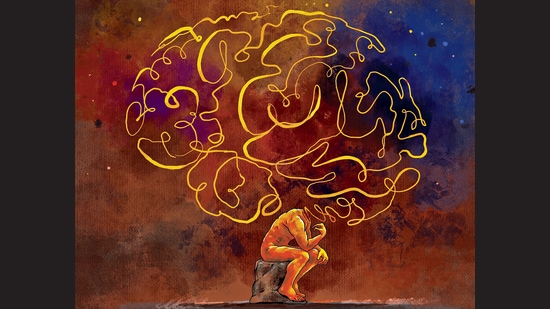A false dualism? The trouble with mind over matter
The separation of mind and body served a vital purpose in the 17th century, as the Renaissance sought to exalt the intellect in a time of rigid state and church control. Today, it hampers discussions of health and science, say proponents of the no-mind thesis.
The term “mind” has no place in the fields of science and health, says Joe Gough, a PhD student of philosophy at the University of Sussex. Using the term, he argues, contributes to the vagueness in conversations around what we call mental health.

Gough is not the only one propagating what he calls the no-mind thesis. Since the 1940s, the argument has been building that the concept of the mind is a philosophical illusion no longer helpful to the study of the individual.
In the 1970s, American philosopher Richard Rorty argued that many of our seemingly unanswerable questions, such as the precise nature of the relationship between mind and body, were the result of erroneous ideas that could be traced back to philosophers such as Rene Descartes, John Locke and Immanuel Kant, and the 17th and 18th centuries.
In his book, Meditations on First Philosophy, first published in 1641, Descartes argued that the mind and body were two discrete entities. While the body is material (corporeal), he said, the mind is immaterial (incorporeal). Until him, such a separation was not part of mainstream philosophy. In fact, this idea of duality came to be named after him, and is known as “Cartesian dualism”.
The duality was in keeping with the mood of the Renaissance, with its focus on the individual and the metaphysical. It’s helpful to remember that this was a period when great, well, minds like the astronomer and physicist Galileo were being imprisoned by the Church for talking and writing about their scientific discoveries. The concept of the mind emerged as a counter to the control wielded by organised religion over the individual and over thought. The idea of the mind became part of a vital glorification of the intellect that would drive the Renaissance, spark an era of innovation, and contribute to a reordering of how the individual viewed his place in society.
Think again
Today, proponents of the no-mind thesis argue, the terms “mind” and “mental” are less than helpful. When used in discussions of science and health, they bring with them inappropriate connotations that the “mental” is non-physical, perhaps even immaterial (as in unimportant) or otherwise less than real.
Because the dualism separates states of the mind from states of the body, it causes a kind of conceptual ambiguity that makes it difficult for people to understand psychological illnesses, acknowledge that these illnesses might have physiological symptoms, and understand or believe that states of mind can have ramifications for the state of the body. Additionally, because the terms are so ambiguous and undefined, they can hamper treatment and discussions around health.
Proponents of the no-mind thesis do not dispute that people are talking about something when they use the terms “mind” and “mental”. The problem, they argue, is that they are often talking about too many things at once.
“When people talk about ‘the mind’, they often mean agency; other times, cognition; yet others, consciousness; other uses of the word “mental,” however, mean psychiatric; others, psychological; still others, immaterial; and still others, something else,” Gough tells Wknd.
This conceptual blurriness makes the idea of “the mind” more of a hindrance than a help, especially when it comes to science and medicine.
The good word
So what terms should one use instead? Gough prefers “psychiatric” when discussing medical conditions that fall within that field. “It seems more honest, more accurate, and less potentially misleading,” he says. “When it comes to the subject matter of psychology, I prefer ‘psychological’.”
The thing is, he adds, there can be no one-to-one replacement, or one ends up reproducing the problems one started with. “There need to be multiple replacements depending on what exactly we are talking about.”
Gough acknowledges that the terms “mind” and “mental” are so widely used that they would be extremely difficult to eradicate. “Success, for me, is people debating the thesis and thinking about it,” he says.
The biggest challenge to the no-mind thesis, though, doesn’t relate to the prevalence of these terms or to how long they’ve been in use. It has to do with the fact that if we were to think of the mind and the mental as inherent, core and inseparable from the body, that would involve some serious, to use another ambiguous term, soul-searching. It would mean that we’d been seeing things a bit upside-down all this while; thinking rather wonkily about things that are key to how we function.
What would you need to change about the way you think about yourself? Boggles the mind a bit, doesn’t it?
All Access.
One Subscription.
Get 360° coverage—from daily headlines
to 100 year archives.



HT App & Website






